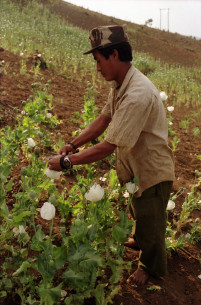Drugs and Conflict in Burma (Myanmar) Dilemmas for Policy Responses
Regiones
This issue of Drugs & Conflict tries to bring nuance to the polarised debate on the Rangoon-focussed political agenda, the demonising of the ceasefire groups and repressive drug policy approaches.

Autores
Burma is on the brink of yet another humanitarian crisis. In the Kokang region, an opium ban was enforced last year, and by mid-2005 no more poppy growing will be allowed in the Wa region. Banning opium from these regions in Shan State adds another chapter to the long and dramatic history of drugs, conflict and human suffering in the country.
With this issue of Drugs & Conflict TNI tries to bring nuance to the polarised debate on the Rangoon-focussed political agenda, the demonising of the ceasefire groups and repressive drug policy approaches. Hundreds of thousands of people who depend on the opium economy risk being sacrificed in an effort to comply with international pressures about drug-free deadlines. Community livelihoods face being crushed between the pincers of the opium ban and tightened sanctions.
The unfolding drama caused by the opium bans is forcing the international community to rethink its strategies. Enforcement of tight deadlines will result in major food shortages and may jeopardise the fragile social stability in the areas. To sustain the gradual decline in opium production, alternative sources of income for basic subsistence farmers have to be secured. Without adequate resources, the longer-term sustainability of ‘quick solutions' is highly questionable. Since military authorities are eager to comply with promises made, law enforcement repression is likely to increase, with human rights abuses and more displacement a potential outcome.
The only viable and humane option lies in a simultaneous easing of drug control deadline pressures and increasing international humanitarian aid efforts. Both require stronger international engagement of a different kind to that we have seen so far.
Pages: 32

